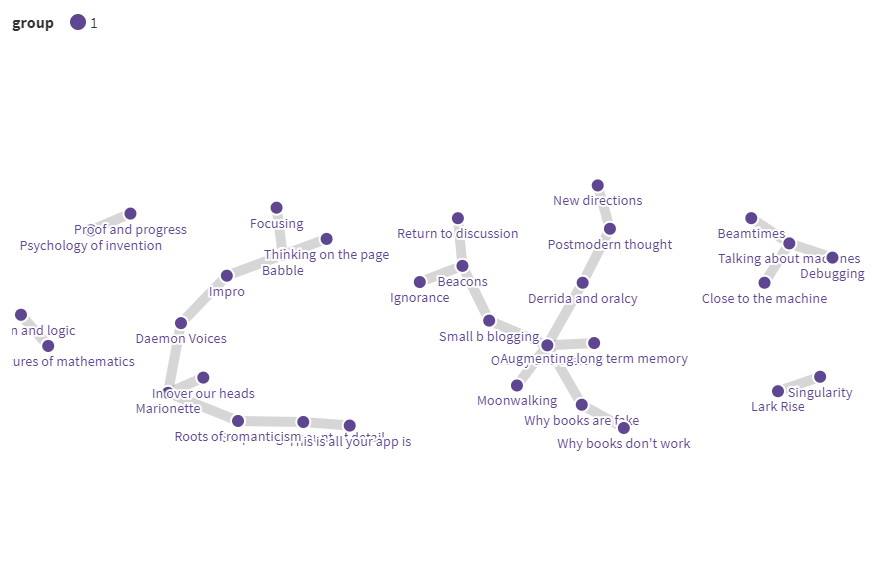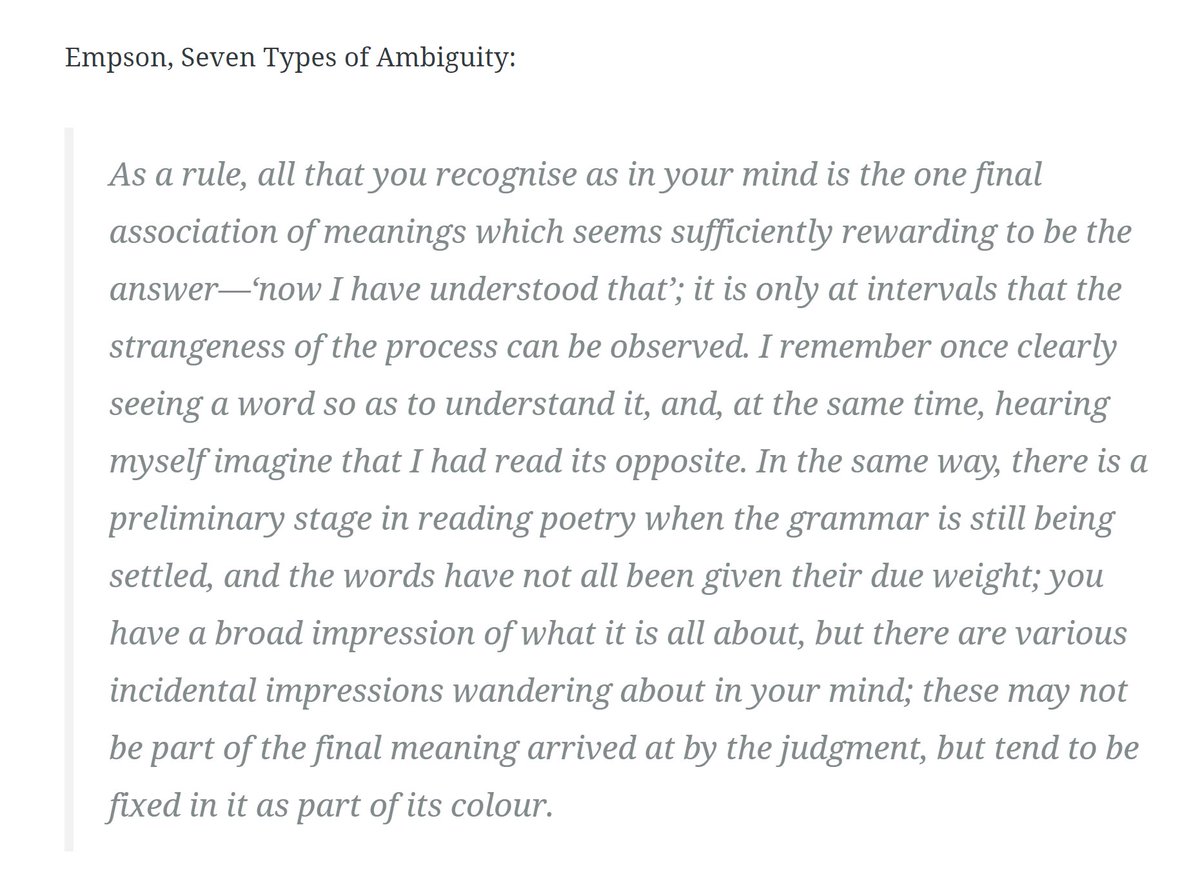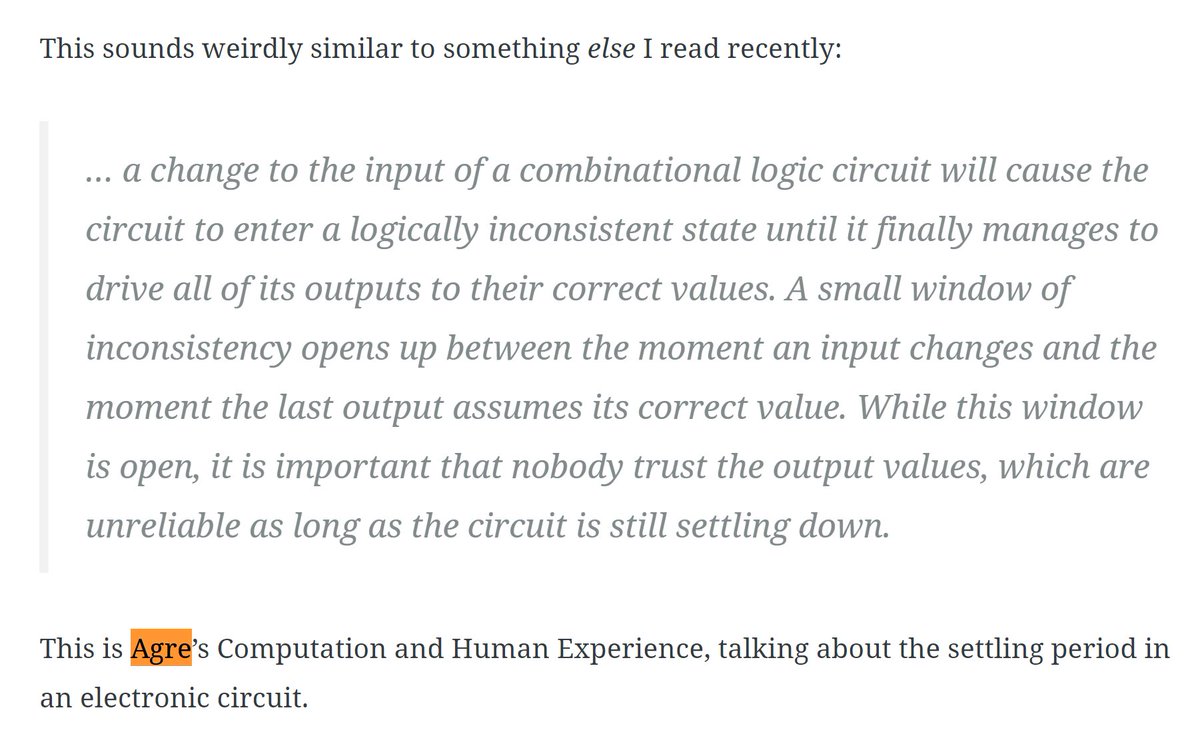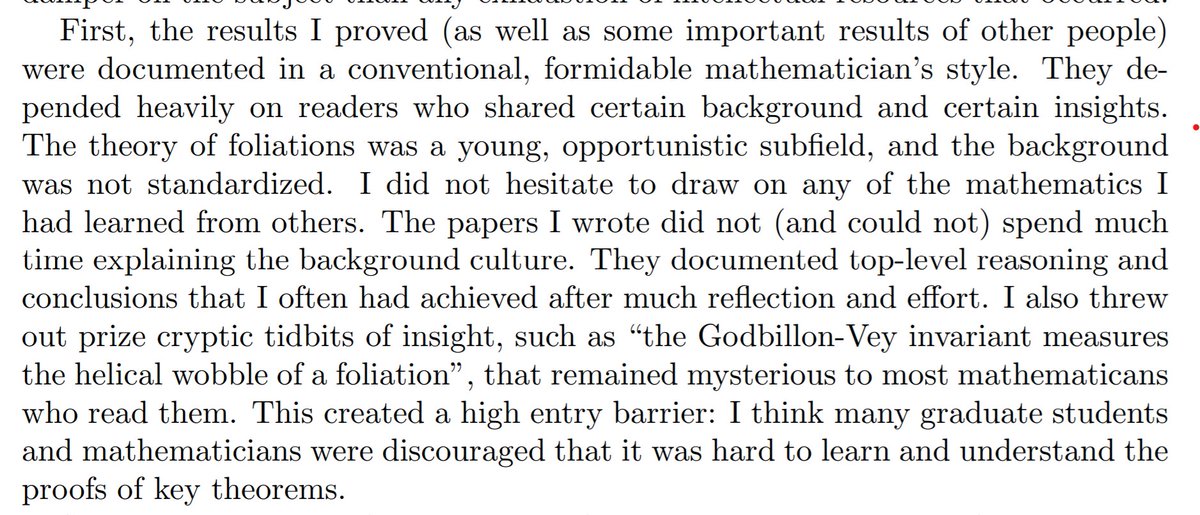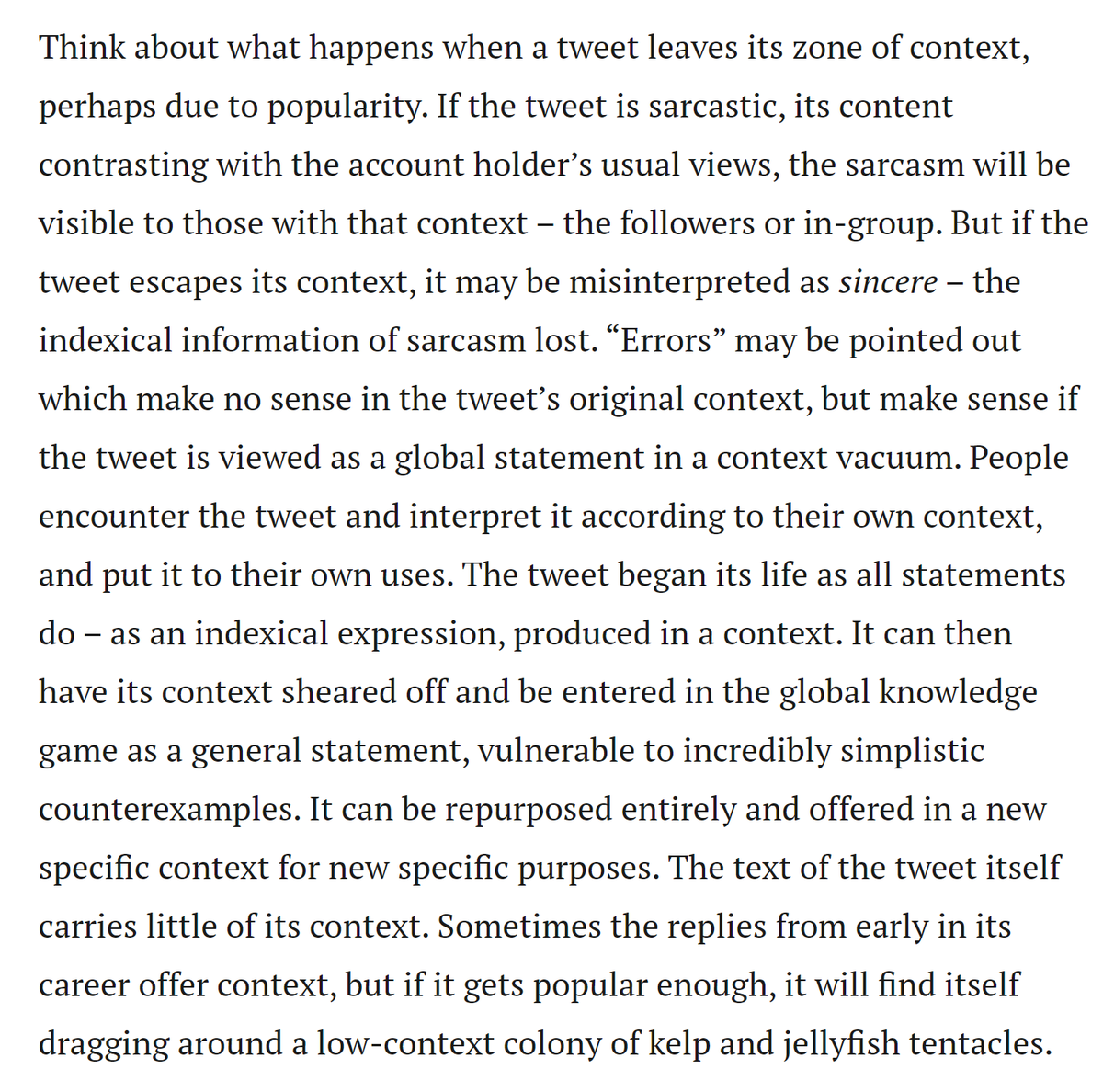Not really in the mood for @threadapalooza but this is an IOU for a thread inspired by @DRMacIver's book pairings one.
I'll expand it to include internet writings to make my life easier and also because I barely distinguish them in my head https://twitter.com/DRMacIver/status/1334465597363658762
I'll expand it to include internet writings to make my life easier and also because I barely distinguish them in my head https://twitter.com/DRMacIver/status/1334465597363658762
Also maybe a few papers, I dunno. Text that goes well with other text.
John Salvatier - Reality has a surprising amount of detail
Jeff Atwood - This is all your app is: a collection of tiny details
Posts about the extraordinary surplus of detail in the world, in carpentry and automated cat feeders
http://johnsalvatier.org/blog/2017/reality-has-a-surprising-amount-of-detail
https://blog.codinghorror.com/this-is-all-your-app-is-a-collection-of-tiny-details/
Jeff Atwood - This is all your app is: a collection of tiny details
Posts about the extraordinary surplus of detail in the world, in carpentry and automated cat feeders
http://johnsalvatier.org/blog/2017/reality-has-a-surprising-amount-of-detail
https://blog.codinghorror.com/this-is-all-your-app-is-a-collection-of-tiny-details/
John Salvatier - Reality has a surprising amount of detail
Isaiah Berlin - The Roots of Romanticism
One thing I like about the Salvatier post is that it's an expression of a a very romantic sensibility, but in rationalist language. Berlin book is about history of romanticism.
Isaiah Berlin - The Roots of Romanticism
One thing I like about the Salvatier post is that it's an expression of a a very romantic sensibility, but in rationalist language. Berlin book is about history of romanticism.
3. Oh yeah, I should add numbers.
Keith Johnstone - Impro
alkjash - Babble
Creativity and making stuff up https://www.lesswrong.com/posts/i42Dfoh4HtsCAfXxL/babble
Keith Johnstone - Impro
alkjash - Babble
Creativity and making stuff up https://www.lesswrong.com/posts/i42Dfoh4HtsCAfXxL/babble
4. Cosma Shalizi - The singularity in our past light cone
Flora Thompson - Lark Rise to Candleford
Post on the disorienting rate of change in the nineteenth century, and an account living through it, in 1890s Oxfordshire
http://bactra.org/weblog/699.html
Flora Thompson - Lark Rise to Candleford
Post on the disorienting rate of change in the nineteenth century, and an account living through it, in 1890s Oxfordshire
http://bactra.org/weblog/699.html
5. Philip Pullman - Daemon Voices
Heinrich von Kleist - On the Marionette Theatre
Pullman on storytelling, and one of his key influences for His Dark Materials - a short story from a weird romantic writer
https://southerncrossreview.org/9/kleist.htm
Heinrich von Kleist - On the Marionette Theatre
Pullman on storytelling, and one of his key influences for His Dark Materials - a short story from a weird romantic writer
https://southerncrossreview.org/9/kleist.htm
6. Heinrich von Kleist - On the Marionette Theatre
Berlin - The Roots of Romanticism
Kleist is barely mentioned in the Berlin book, but his theory of human development seems to be inspired by Schiller, who gets a section
Berlin - The Roots of Romanticism
Kleist is barely mentioned in the Berlin book, but his theory of human development seems to be inspired by Schiller, who gets a section
7. Heinrich von Kleist - On the Marionette Theatre
Robert Kegan - In Over Our Heads
Talking of theories of human development...
Robert Kegan - In Over Our Heads
Talking of theories of human development...
8. Julian Orr - Talking about Machines
Ellen Ullman - Close to the Machine
Fighting with broken photocopiers vs fighting with broken software, in a similarish time and place. Also they both have 'machine' in the title
Ellen Ullman - Close to the Machine
Fighting with broken photocopiers vs fighting with broken software, in a similarish time and place. Also they both have 'machine' in the title
9. Julian Orr - Talking about Machines
Sharon Traweek - Beamtimes and Lifetimes
More ethnographic observations of fighting with machines, this time among particle physicists
Sharon Traweek - Beamtimes and Lifetimes
More ethnographic observations of fighting with machines, this time among particle physicists
10. Julian Orr - Talking about Machines
David Agans - Debugging
A practical guide to fighting with machines
David Agans - Debugging
A practical guide to fighting with machines
My brain gets fried surprisingly quickly, already threading things in the wrong place. Guess I'll be dribbing these out slowly over the next several days.
11. Oh, one link I missed
Pullman - Daemon Voices
Johnstone - Impro
These go really well - Pullman's book is about the 'making it up', storytelling, idea generation side of writing
Pullman - Daemon Voices
Johnstone - Impro
These go really well - Pullman's book is about the 'making it up', storytelling, idea generation side of writing
12. Gendlin - Focusing
alkjash - Babble
Was planning to include Focusing at some point, @meekaale is doing the work for me https://twitter.com/meekaale/status/1339284459393331200
alkjash - Babble
Was planning to include Focusing at some point, @meekaale is doing the work for me https://twitter.com/meekaale/status/1339284459393331200
13. alkjash - Babble
14. Whaaales - Thinking on the page
'Thinking on the page' = babble writing unmoored from felt sense
https://whaaales.com/thinking-on-the-page/ https://twitter.com/meekaale/status/1339284738981425152
14. Whaaales - Thinking on the page
'Thinking on the page' = babble writing unmoored from felt sense
https://whaaales.com/thinking-on-the-page/ https://twitter.com/meekaale/status/1339284738981425152
Got overexcited with the numbering on the last one. Anyway...
14. Timothy Gowers - The Two Cultures of Mathematics [pdf]
Poincaré - Intuition and Logic in Mathematics
Two types of two types of mathematician
https://www.dpmms.cam.ac.uk/~wtg10/2cultures.pdf https://mathshistory.st-andrews.ac.uk/Extras/Poincare_Intuition/
14. Timothy Gowers - The Two Cultures of Mathematics [pdf]
Poincaré - Intuition and Logic in Mathematics
Two types of two types of mathematician
https://www.dpmms.cam.ac.uk/~wtg10/2cultures.pdf https://mathshistory.st-andrews.ac.uk/Extras/Poincare_Intuition/
 migraine interlude
migraine interlude 
Will resume at the weekend or something
15. Walter Ong - Orality and Literacy
Joshua Foer - Moonwalking with Einstein
Ong describes uses of memory in oral cultures
Foer is fun pop book about mnemonics that touches on similar history
Joshua Foer - Moonwalking with Einstein
Ong describes uses of memory in oral cultures
Foer is fun pop book about mnemonics that touches on similar history
16. Walter Ong - Orality and Literacy
Tom Critchlow - Small b blogging
https://tomcritchlow.com/2018/02/23/small-b-blogging/
This is a weird one but makes sense in my head
Ong is about how text became more durable and thinglike. Critchlow is the reverse - how text refragments into high-context networks
Tom Critchlow - Small b blogging
https://tomcritchlow.com/2018/02/23/small-b-blogging/
This is a weird one but makes sense in my head
Ong is about how text became more durable and thinglike. Critchlow is the reverse - how text refragments into high-context networks
17. Walter Ong - Orality and Literacy
Christopher Norris - Derrida and Oralcy: Grammatology revisited
Derrida was also deeply interested in the differences between speech and writing. Norris explains it a way I can understand
http://www2.lingue.unibo.it/acume/acumedvd/zone/research/essays/norris.htm
Christopher Norris - Derrida and Oralcy: Grammatology revisited
Derrida was also deeply interested in the differences between speech and writing. Norris explains it a way I can understand
http://www2.lingue.unibo.it/acume/acumedvd/zone/research/essays/norris.htm
18. Walter Ong - Orality and Literacy
Michael Nielsen - Augmenting Long Term Memory
http://augmentingcognition.com/ltm.html
Another angle on the memory connection. Using spaced repetition to make knowledge more articulated
Michael Nielsen - Augmenting Long Term Memory
http://augmentingcognition.com/ltm.html
Another angle on the memory connection. Using spaced repetition to make knowledge more articulated
19. Walter Ong - Orality and Literacy
Sarah Perry - Why Books are Fake
https://www.ribbonfarm.com/2017/06/01/why-books-are-fake/
Ong is about how books became more like discrete decontextualised objecty chunks over time. Perry is about how this is always somewhat fake
Sarah Perry - Why Books are Fake
https://www.ribbonfarm.com/2017/06/01/why-books-are-fake/
Ong is about how books became more like discrete decontextualised objecty chunks over time. Perry is about how this is always somewhat fake
20. Sarah Perry - Why Books are Fake
Andy Matuschak - Why books don't work
https://andymatuschak.org/books/
Can't resist pairing these two. These book thingies sure are useless!
Both explore leaks in the 'book as discrete object that teaches you things' idea
Andy Matuschak - Why books don't work
https://andymatuschak.org/books/
Can't resist pairing these two. These book thingies sure are useless!
Both explore leaks in the 'book as discrete object that teaches you things' idea
21. Norris - Derrida and Oralcy
Tasic - Mathematics and the Roots of Postmodern Thought
I've got this crankish idea that Derrida's writing/speech distinction also crops up in mathematics
Tasic is the closest I've seen to working this out. https://twitter.com/drossbucket/status/1059038724237991938
Tasic - Mathematics and the Roots of Postmodern Thought
I've got this crankish idea that Derrida's writing/speech distinction also crops up in mathematics
Tasic is the closest I've seen to working this out. https://twitter.com/drossbucket/status/1059038724237991938
22. Tasic - Mathematics and the Roots of Postmodern Thought
Tymoczko - New Directions in the Philosophy of Mathematics
Books that use resources from postmodernism and phenomenology to think about mathematics
Tymoczko - New Directions in the Philosophy of Mathematics
Books that use resources from postmodernism and phenomenology to think about mathematics
23. Tom Critchlow - Small b blogging
Ben Hoffman - On the construction of beacons
http://benjaminrosshoffman.com/construction-beacons/
Another angle on high-context blogging - avoiding grifters in an adversarial environment - 'don't make the beacon too large'
Ben Hoffman - On the construction of beacons
http://benjaminrosshoffman.com/construction-beacons/
Another angle on high-context blogging - avoiding grifters in an adversarial environment - 'don't make the beacon too large'
24. Ben Hoffman - On the construction of beacons
Sarah Constantin - A Return to Discussion
https://srconstantin.wordpress.com/2016/11/27/hiding-in-plain-sight/
Constantin's post is about going in the opposite direction, leaving your niche and making writing more public and defensible again
Sarah Constantin - A Return to Discussion
https://srconstantin.wordpress.com/2016/11/27/hiding-in-plain-sight/
Constantin's post is about going in the opposite direction, leaving your niche and making writing more public and defensible again
25. A literal banana - Ignorance, a skilled practice
Ben Hoffman - On the construction of beacons
https://carcinisation.com/2020/01/27/ignorance-a-skilled-practice/
I could link this one to almost anything (and will do if I run out of ideas). It's about this whole idea of varying context
Ben Hoffman - On the construction of beacons
https://carcinisation.com/2020/01/27/ignorance-a-skilled-practice/
I could link this one to almost anything (and will do if I run out of ideas). It's about this whole idea of varying context
(linking it here in particular because of some vague similarity about ignorance and high context both being defensive practices, not too sure I can articulate the details but I think they would work together)
26. Hadamard - The Psychology of Invention in the Mathematical Field
Thurston - On Proof and Progress in Mathematics
https://arxiv.org/abs/math/9404236
Two essays on how people actually think while doing mathematics by top level practitioners
Thurston - On Proof and Progress in Mathematics
https://arxiv.org/abs/math/9404236
Two essays on how people actually think while doing mathematics by top level practitioners
27. John Salvatier - Reality has a surprising amount of detail
David Chapman - Doing being rational: the polymerase chain reaction
https://meaningness.com/metablog/rational-pcr
Video analysis as a practice for surfacing tiny fascinating details
David Chapman - Doing being rational: the polymerase chain reaction
https://meaningness.com/metablog/rational-pcr
Video analysis as a practice for surfacing tiny fascinating details
28. A literal banana - Ignorance: a skilled practice
David Chapman - Doing being rational: the polymerase chain reaction
Two useful posts for learning some ethnomethodology jargon - indexicality in the first case, repair in the second
David Chapman - Doing being rational: the polymerase chain reaction
Two useful posts for learning some ethnomethodology jargon - indexicality in the first case, repair in the second
29. Julian Orr - Talking about machines
David Chapman - Doing being rational: the polymerase chain reaction
Some shared theme about fixing balky equipment and filling in the gaps in incomplete instructions
David Chapman - Doing being rational: the polymerase chain reaction
Some shared theme about fixing balky equipment and filling in the gaps in incomplete instructions
30. Dan Luu - Teach debugging
David Agans - Debugging
https://danluu.com/teach-debugging/
Luu makes the case for teaching debugging explicitly. The Agans book is a collection of tips for how to improve at debugging
David Agans - Debugging
https://danluu.com/teach-debugging/
Luu makes the case for teaching debugging explicitly. The Agans book is a collection of tips for how to improve at debugging
31. Phil Agre - Computation and human experience
William Empson - Seven Types of Ambiguity
These have a weirdly similar pair of quotes, but one is about poetry and the other is about logic circuits
https://drossbucket.com/newsletters/december-2018-bells-theorem-and-end-of-year-review/
William Empson - Seven Types of Ambiguity
These have a weirdly similar pair of quotes, but one is about poetry and the other is about logic circuits
https://drossbucket.com/newsletters/december-2018-bells-theorem-and-end-of-year-review/
32. Phil Agre - Computation and human experience
Brian Cantwell Smith - On the Origin of Objects
Original distinctive insightful perspectives on computation
Brian Cantwell Smith - On the Origin of Objects
Original distinctive insightful perspectives on computation
33. Donald Schön - The Reflective Practitioner
Matthew Crawford - The World Beyond Your Head
Books about developing expertise in a craft or profession
Matthew Crawford - The World Beyond Your Head
Books about developing expertise in a craft or profession
34. Donald Schön - The Reflective Practitioner
Venkatesh Rao - The Calculus of Grit
https://www.ribbonfarm.com/2011/08/19/the-calculus-of-grit/
These are both about developing an 'intrinsic coordinate system' of taste for a domain, learning to see better through conversation with the materials
Venkatesh Rao - The Calculus of Grit
https://www.ribbonfarm.com/2011/08/19/the-calculus-of-grit/
These are both about developing an 'intrinsic coordinate system' of taste for a domain, learning to see better through conversation with the materials
35. Matthew Crawford - The World Beyond Your Head
Flora Thompson - Lark Rise
Vivid portraits of craftspeople - the shoemakers and blacksmiths in Lark Rise, and the organmakers in the final chapter of the Crawford book
Flora Thompson - Lark Rise
Vivid portraits of craftspeople - the shoemakers and blacksmiths in Lark Rise, and the organmakers in the final chapter of the Crawford book
36. Chris Olah and Shan Carter - Research debt
William Thurston - Proof and progress in mathematics
https://distill.pub/2017/research-debt/
Both discuss how missing and inadequate explanations hold back research
William Thurston - Proof and progress in mathematics
https://distill.pub/2017/research-debt/
Both discuss how missing and inadequate explanations hold back research
37. Chris Olah and Shan Carter - Research debt
David MacIver - We are surrounded by ghosts
https://notebook.drmaciver.com/posts/2020-02-16-14:22.html
Another perspective on missing explanations: 'ghost theorems' and ghost knowledge in general, known by a research community but inaccessible to outsiders
David MacIver - We are surrounded by ghosts
https://notebook.drmaciver.com/posts/2020-02-16-14:22.html
Another perspective on missing explanations: 'ghost theorems' and ghost knowledge in general, known by a research community but inaccessible to outsiders
38. David MacIver - We are surrounded by ghosts
William Thurston - Proof and progress in mathematics
Completing the loop, Thurston discusses the problems of ghost knowledge:
William Thurston - Proof and progress in mathematics
Completing the loop, Thurston discusses the problems of ghost knowledge:

 Read on Twitter
Read on Twitter